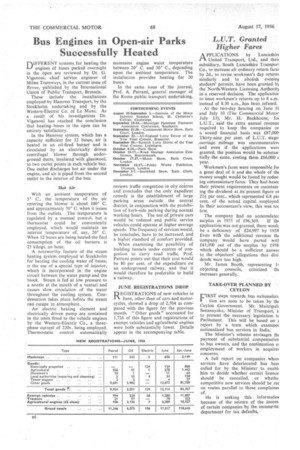• Bus Engines in Open-air Parks Successfully Heated
Page 40

If you've noticed an error in this article please click here to report it so we can fix it.
DIFFERENT systems for heating the engines of buses parked overnight in the open are reviewed by Dr. G. Viganoni, chief service engineer of Milan Tramways, in the current issue of Revue, published by the Internatiorial Union of Public Transport, Brussels.
These include the installations employed by Hanover Transport, by the Stockholm undertaking and by the Western-Electric Co. of Le Mans. As a result of his investigations Dr. Viganoni has reached the conclusion that heating buses in the open can be entirely satisfactory.
In the Hanover system, which has a capacity sufficient for 12 buses, air is heated in an oil-fired burner and is circulated by an electrically driven centrifugal blower through underground ducts, insulated with glasswooL to two outlet points in each vehicle bay. One outlet discharges hot air under the engine, and air is piped from the second outlet to the interior of the bus.
Hot Air With an _ ambient temperature of 5° C., the • temperature of the air entering the blower is about 100' C. and approximately 70° C. when it issues from the outlets. The temperature is regulated by a manual control, but a thermostat could be conveniently employed, which would maintain an interior temperature of, say, 20° C. When 12 buses are being heated the fuel consumption of the oil burners is 25 kilogs. an hour.
A noteworthy feature of the steam heating system employed at Stockholm for heating the cooling water of buses, is the use of a special type of injector, which is incorporated in the engine circuit between the water pump and the block. Steam is fed at low pressure to a nozzle at the mouth of a venturi and causes slow circulation of the water throughout the cooling system. Condensation takes place before the steam can escape to atmosphere.
An electric heating element and electrically driven pump are contained in the units fitted to the vehicle engines by the Western-Electric Co., a threephase current of 220v. being employed. Thermostatic control automatically maintains engine water temperature between 20° C. and 30° C., depending upon the ambient temperature. The installation provides heating for 20 buses.
In the same issue of the journal, Prof. A. Patrassi, general manager of the Rome public transport undertaking, reviews traffic congestion in city centres and concludes that the only expedient remedy is the establishment of large parking areas outside the central district, in conjunction with the prohibition of kerb-side parking during normal working hours. The use of private cars would be reduced • and public service vehicles could operate at higher average speeds. The frequency of services would, he concludes, have to be increased, and a higher standard of comfort provided.
When examining the possibility of building tunnels under centres of congestion to carry road traffic, Prof. Patrassi points out that their cost would be 80 per cent, of th6 expenditure on an underground railway, and that it would therefore be preferable to build a railway.
JUNE REGISTRATIONS DROP DEGISTR N
ATIOS of new vehicles in I June, other than of cars and motorcycles, showed a drop of 2,504 as compared With the figure for the previous month. "Other goods" accounted for 1,726 of this figure and registrations of exempt vehicles and agricultural engines were both substantially lower. Details appear in the accompanying table.
L.U.T. Granted Higher Fares
APPLICATIONS by Lancashire United Transport, Ltd., and theii subsidiary, South Lancashire Transport Co., to increase all ordinary return fare by 2d., to revise workmen's day returns similarly and to abolish evening students' permits, have been granted by the North-Western Licensing Authority in a reserved decision. The application to issue workmen's returns up to 8 a.m. instead of 8.30 a.m., has been refused.
At the two-day hearing on June lE and July 10 (The Commercial Motor July 13), Mr.. H. Backhouse, foi L.U.T., said the extra annual revenue required to keep the companies or a sound financial basis was £87,000 Thirty-nine per cent. of L.U.T. stage,carriage mileage was unremunerative and even if the applications were granted, the position would be substart tially the same, costing them £66,000 a year.
Workmen's fares were responsible fen a great deal of it and the whole of the money sought would be found by reducing concessionary fares. They had hase their pfesent requirements on maintaining the dividend at its present figure oi 22-f per cent., which represented 6.8 pet cent. of the actual capital employed In their accountant's view, this was toc low.
The company had an accumulatec surplus in 1955 of £96,369. If the application was not granted, there woulc be a deficiency of £24,997 by 1958 Even with the additional revenue the company would have parted witI £41,000 out of the surplus by 1958 which should be a sufficient answei to the objectors' allegations that divi dends were too high.
Mr. James Booth, representing le objecting councils, criticized the increases generally.
TAKE-OVER PLANNED BY CEYLON L'IRST steps towards bus nationaliza
tion are soon to be taken by the Ceylon Government. Mr. Maittipalt Senanayake, Minister of Transport, it to present the necessary legislation te Parliament. This will be based on 2 report by a team which examinee nationalized bus services in India,
The Minister's scheme envisages the payment of substantial compensafior to bus owners, and the continuation 01 employment of workers in acquire( concerns..
A full report on companies whosi services have deteriorated has beer called for by the Minister to enabl4 him to decide whether certain licence should be cancelled, or whethe competitive new services should be rut on routes parallel to those complainee of.
He is seeking this informatioi because of the seizure of the incOrni of certain companies by the income-ta] department for tax defaults.




































































































